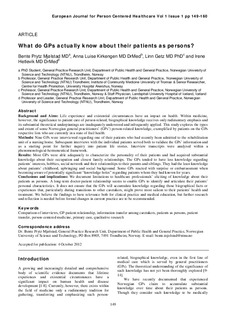What Do GPs Actually Know About Their Patients As Persons?
Journal article, Peer reviewed
Permanent lenke
http://hdl.handle.net/11250/2356159Utgivelsesdato
2013Metadata
Vis full innførselSamlinger
Sammendrag
Background and Aims: Life experience and existential circumstances have an impact on health. Within medicine, however, the significance to patient care of person-related, biographical knowledge receives only rudimentary emphasis and its substantial theoretical underpinnings are inadequately understood and infrequently applied. This study explores the types and extent of some Norwegian general practitioners’ (GPs’) person-related knowledge, exemplified by patients on the GPs respective lists who are currently in a state of frail health.
Methods: Nine GPs were interviewed regarding 1 of their patients who had recently been admitted to the rehabilitation unit of a nursing home. Subsequent interviews with the individual patients served both to validate the GPs’ information and as a starting point for further inquiry into patient life stories. Interview transcripts were analyzed within a phenomenological-hermeneutical framework.
Results: Most GPs were able adequately to characterize the personality of their patients and had acquired substantial knowledge about their occupation and closest family relationships. The GPs tended to have less knowledge regarding patients’ interests, hobbies, social network and their relationships to their parents and siblings. They had the least knowledge about patients’ childhood, upbringing and social background. Some GPs reacted with surprise or embarrassment when becoming aware of potentially significant “knowledge holes” regarding patients whom they had known for years.
Conclusions and implications: We document limitations to healthcare professionals’ eliciting of knowledge about their patients as persons. A long-term doctor-patient relationship seems to enable GPs to identify and articulate their patients’ personal characteristics. It does not ensure that the GPs will accumulate knowledge regarding those biographical facts or experiences that, particularly during transitions to other caretakers, might prove most salient to their patients’ health and treatment. We believe the findings to have relevance both for clinical practice and medical education, but further research and reflection is needed before formal changes in current practice are to be recommended.
Beskrivelse
- Published article
